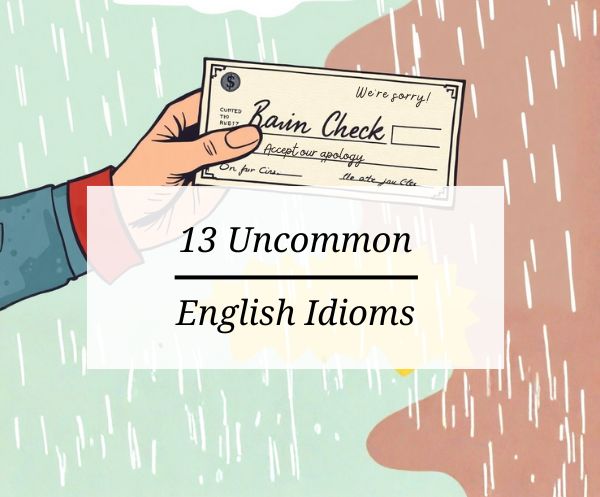Have you ever found yourself utterly lost when someone says something like “Bob’s your uncle” or “I’ll take a rain check”?
You’re not alone. Even advanced English learners (and some native speakers) sometimes wonder where these curious expressions come from — and what on earth they really mean.
Let’s clear that up! Here are various uncommon idioms you might hear in movies, conversations, or even in British or American media, along with their origins, examples, and simple explanations.
1. To kick the bucket
A polite way to say to die.
There are two main theories about where this expression came from. One links it to executions: prisoners would stand on a bucket (or similar object) that was then kicked away. The other points to farming, where a bucket was once a beam used to hang animals before slaughter — and as they struggled, they’d “kick the bucket.”
Example:
A: I’d love to visit Iceland one day.
B: Same here — it’s on my list before I kick the bucket.
Grammar tip:
Notice how “kick the bucket” is used like a regular verb phrase: kicked the bucket, kicking the bucket, etc.
2. To take a rain check
This one’s more common in American English. It means to postpone or decline something for now, but with the intention of doing it later.
It originated from baseball in the 1800s: when a game was canceled due to rain, ticket holders received a “rain check” — a coupon allowing them to attend the rescheduled game.
Example:
A: Want to go for a drink tonight?
B: I’d love to, but I have to finish this project. Can I take a rain check?
3. Bob’s your uncle!
This expression means “and there you have it!” or “it’s that easy!”.
It’s mainly used in British and Australian English and dates back to the 1880s, when British Prime Minister Robert “Bob” Cecil was accused of promoting his nephew to political office — hence, “Bob’s your uncle” became slang for “you’re all set.”
Example:
Just add some milk, a bit of sugar, and — Bob’s your uncle! — perfect tea.
4. To bite the bullet
This phrase means to do something difficult or unpleasant that you’ve been avoiding.
It comes from old battlefield medicine. Before anesthesia, soldiers were sometimes given a bullet to bite during surgery to help them endure the pain.
Example:
I really don’t want to go to the dentist, but I’ll bite the bullet and book an appointment.
5. Not my cup of tea
This British idiom means “it’s not something I like or enjoy.”
It likely developed during the early 20th century, when tea was central to British culture — so saying something wasn’t your cup of tea implied it wasn’t to your taste.
Example:
I know everyone loves horror movies, but they’re not my cup of tea.
6. To let the cat out of the bag
To reveal a secret accidentally (or too soon).
This dates back to old marketplace scams: sellers would offer to sell a piglet in a sack, but sometimes replaced it with a cat. Once the cat was let out of the bag, the trick was revealed.
Example:
A: Did you tell her about the surprise party?
B: Oops… I might have let the cat out of the bag.
7. To chew the fat
This means to chat casually or to have a friendly conversation.
The origin is debated, but one theory suggests sailors or soldiers used to chew salted pork fat during long, informal talks. Today, it simply means chatting for fun.
Example:
We stayed up till midnight just chewing the fat about old times.
Regional note:
In the U.S., this is still common; in the U.K., you might hear “have a natter” or “have a chinwag” instead.
8. To go pear-shaped
This British expression means something has gone wrong or failed.
It dates back to the Royal Air Force in the 1940s. Trainee pilots who didn’t execute perfect circular maneuvers ended up with “pear-shaped” flight paths — a humorous way of saying something went off course.
Example:
Our camping trip went pear-shaped when it started raining and the tent collapsed.
9. To have a frog in your throat
If someone says this, they mean you have trouble speaking clearly because of a sore throat.
It’s not about actual frogs (thankfully). The phrase likely appeared in the late 19th century, when the sensation of a swollen or dry throat was compared to having something stuck there.
Example:
Sorry if my voice sounds weird — I’ve got a frog in my throat.
10. To spill the beans
To reveal a secret or confidential information, similar to “let the cat out of the bag.”
This may come from ancient Greece, where voting was sometimes done using beans — white for yes, black for no. If someone “spilled the beans,” the results were revealed too early.
Example:
Don’t spill the beans about our plan! It’s supposed to be a surprise.
11. To be caught red-handed
Meaning to be caught in the act of doing something wrong.
This expression comes from 15th-century Scotland, where laws punished murderers or poachers “caught with blood on their hands.” The “red” literally referred to blood.
Example:
The teacher caught him red-handed copying during the test.
Grammar note:
You can say “was caught red-handed” or “get caught red-handed” depending on tense and formality.
12. To steal someone’s thunder
To take credit for someone else’s idea or achievement.
This idiom has a surprisingly theatrical origin. In the 18th century, a playwright named John Dennis invented a new method for creating thunder sounds on stage. When another theatre copied his technique, Dennis exclaimed, “They will not let my play run, but they steal my thunder!”
Example:
I was going to announce my promotion, but Sarah mentioned hers first and totally stole my thunder.
Bonus: Regional variations worth knowing
“Piece of cake” (U.S.) vs. “Easy as pie” (U.K.)
Both mean something is very easy — though neither cake nor pie is simple to bake!
“Chuffed to bits” (U.K.) = Very pleased
“Over the moon” (also U.K.) = Extremely happy
“To have a face like thunder” (U.K.) = To look very angry
Example:
A: How did your presentation go?
B: Brilliant! I’m chuffed to bits.
A: I knew it would be a piece of cake for you.
Some idioms are also culturally bound. For instance, “Bob’s your uncle” makes sense mainly in the U.K., while “take a rain check” feels distinctly American.
Why learning uncommon idioms matters
Knowing idioms like these helps you:
- Sound more natural and fluent.
- Understand native conversations, jokes, and films.
- Appreciate the cultural history behind the language.
It’s not about memorizing every phrase, but recognizing them when they appear — and maybe using them when the moment feels right.
Quick recap
Here’s a summary of the idioms we explored today:
| Idiom | Meaning | Origin/Notes |
|---|---|---|
| Kick the bucket | To die | Possibly from execution or farming |
| Take a rain check | Postpone politely | Baseball tickets |
| Bob’s your uncle | There you have it | British politics |
| Bite the bullet | Face something tough | Old battlefield medicine |
| Not my cup of tea | Not my taste | British culture |
| Let the cat out of the bag | Reveal a secret | Market scams |
| Chew the fat | Chat casually | Sailors or soldiers |
| Go pear-shaped | Fail or go wrong | British RAF slang |
| Frog in your throat | Throat discomfort | Late 19th century |
| Spill the beans | Reveal information | Ancient Greek voting |
| Caught red-handed | Caught doing wrong | Scottish law |
| Steal someone’s thunder | Take credit | Theatre anecdote |
Final thought
Idioms are like secret passwords in a language: once you learn them, you start hearing them everywhere.
Next time you watch a movie or listen to a podcast, keep an ear out for these. You might even find yourself using one naturally — and when that happens, Bob’s your uncle!
Source:
Adapted and expanded from “10 Unusual Expressions in English and Where They Come From,” originally published by Pearson ELT (2015).





